
The United States Congress is the legislature of the federal government of the United States. It is bicameral, being composed of a lower body, the House of Representatives, and an upper body, the Senate. The Congress meets in the United States Capitol in Washington, D.C. Both senators and representatives are chosen through direct election, though vacancies in the Senate may be filled by a governor's appointment. Congress has 535 voting members: 100 senators and 435 representatives. The vice president of the United States has a vote in the Senate only when senators are evenly divided. The House of Representatives has six non-voting members.

The 1976 United States presidential election was the 48th quadrennial presidential election. It was held on Tuesday, November 2, 1976. Democrat Jimmy Carter of Georgia defeated incumbent Republican President Gerald Ford from Michigan by a narrow victory of 297 electoral college votes to Ford's 240.

Ampex is an American electronics company founded in 1944 by Alexander M. Poniatoff as a spin-off of Dalmo-Victor. The name AMPEX is a portmanteau, created by its founder, which stands for Alexander M. Poniatoff Excellence. Today, Ampex operates as Ampex Data Systems Corporation, a subsidiary of Delta Information Systems, and consists of two business units. The Silicon Valley unit, known internally as Ampex Data Systems (ADS), manufactures digital data storage systems capable of functioning in harsh environments. The Colorado Springs, Colorado unit, referred to as Ampex Intelligent Systems (AIS), serves as a laboratory and hub for the company's line of industrial control systems, cyber security products and services and its artificial intelligence/machine learning technology.
Alexandra Forbes Kerry is an American actress and filmmaker. She is a partner at Locomotive Films and co-founder of Fictional Pictures, a film production company based in New York and Los Angeles. She is married to contemporary art curator Julien Dobbs-Higginson and they have a daughter named Isabelle.
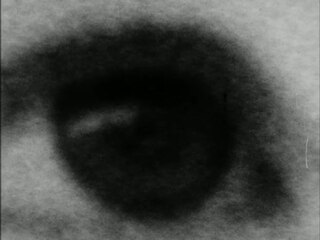
"Daisy", sometimes referred to as "Daisy Girl" or "Peace, Little Girl", was a controversial political advertisement that aired on television as part of Lyndon B. Johnson's 1964 presidential campaign. Though officially aired only once, it is considered one of the most important factors in Johnson's landslide victory over the Republican Party's candidate, Barry Goldwater, and a turning point in political and advertising history. A partnership between the Doyle Dane Bernbach agency and Tony Schwartz, the "Daisy" advertisement was designed to broadcast Johnson's anti-war and anti-nuclear positions. Goldwater was against the Nuclear Test Ban Treaty, and suggested the use of nuclear weapons in the Vietnam War, if necessary. The Johnson campaign used Goldwater's speeches to imply he would wage a nuclear war.
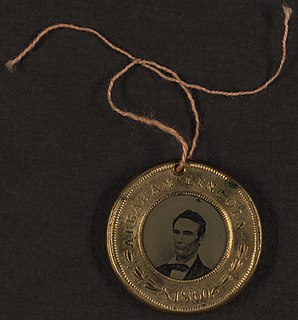
A political campaign is an organized effort which seeks to influence the decision making progress within a specific group. In democracies, political campaigns often refer to electoral campaigns, by which representatives are chosen or referendums are decided. In modern politics, the most high-profile political campaigns are focused on general elections and candidates for head of state or head of government, often a president or prime minister.
Negative campaigning is the process of deliberately spreading negative information about someone or something to worsen the public image of the described. A colloquial, and somewhat more derogatory, term for the practice is mudslinging.
In political campaigns, an attack ad is an advertisement whose message is designed to wage a personal attack against an opposing candidate or political party in order to gain support for the attacking candidate and attract voters. Attack ads often form part of negative campaigning or smear campaigns, and in large or well-financed campaigns, may be disseminated via mass media.

Jesse Benjamin Stoner Jr. was an American lawyer, neo-nazi, segregationist politician, and a domestic terrorist who was convicted in 1980 of the 1958 bombing of the Bethel Baptist Church in Birmingham, Alabama.
The "Stand By Your Ad" provision (SBYA) of the Bipartisan Campaign Reform Act, enacted in 2002, requires candidates in the United States for federal political office, as well as interest groups and political parties supporting or opposing a candidate, to include in political advertisements on television and radio "a statement by the candidate that identifies the candidate and states that the candidate has approved the communication". The provision was intended to force political candidates running any campaign for office in the United States to associate themselves with their television and radio advertising, thereby discouraging them from making controversial claims or attack ads.

The 2006 Oklahoma gubernatorial election was held on November 7, 2006, and was a race for the Governor of Oklahoma. The incumbent Governor, Democrat Brad Henry, was re-elected with more than 66 percent of the vote, beating Republican Ernest Istook, a member of the United States House of Representatives. As of 2022, this was the last time a Democrat has been elected Governor of Oklahoma or won any statewide office.

. In politics, campaign advertising is the use of an advertising campaign through the media to influence a political debate, and ultimately, voters. These ads are designed by political consultants and political campaign staff. Many countries restrict the use of broadcast media to broadcast political messaging. In the European Union, many countries do not permit paid-for TV or radio advertising for fear that wealthy groups will gain control of airtime, making fair play impossible and distorting the political debate in the process.
"Bear", a television commercial known for and often referred to by its opening line "There is a bear in the woods", was created for the 1984 U.S. presidential campaign of Republican Party candidate Ronald Reagan. The commercial featured a grizzly bear wandering through a forest, accompanied by narration suggesting that the bear could be dangerous and that it would be wise to be prepared for that possibility. In the final scene, a man appears and the bear takes a step back. The ad ends with a picture of Reagan and the tagline: "President Reagan: Prepared for Peace."
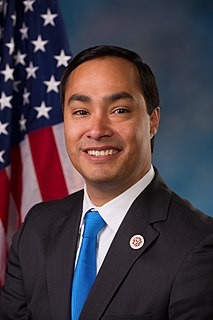
Joaquin Castro is an American lawyer and Democratic politician who has represented Texas's 20th congressional district in the United States House of Representatives since 2013. The district includes just over half of his native San Antonio, as well as some of its nearby suburbs. From 2003 to 2013, Castro represented the 125th district in the Texas House of Representatives. While in the state legislature, he served as vice-chair of the Higher Education Committee and was a member of the Judiciary & Civil Jurisprudence Committee. He also previously served on other committees, such as County Affairs, Border & International Affairs, and Juvenile Justice & Family Issues.
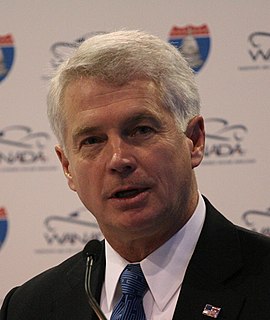
David Keith McCurdy is an American lawyer, politician, lobbyist and former Congressman from Oklahoma's 4th congressional district. McCurdy is a former president of the American Gas Association.
Oklahoma's 5th congressional district is a congressional district in the U.S. state of Oklahoma. It borders all of the other congressional districts in the state except the 1st district. It is densely populated and covers almost all of Oklahoma County and all of Pottawatomie and Seminole counties. Although it leans Republican, with a Cook PVI rating of R+7, it is still considered the least Republican district in the state.

BBC Archives are collections documenting the BBC's broadcasting history, including copies of television and radio broadcasts, internal documents, photographs, online content, sheet music, commercially available music, BBC products, press cuttings, artifacts and historic equipment. The original contents of the collections are permanently retained but are in the process of being digitised. Some collections are being uploaded to the BBC Archives section of the BBC Online website for visitors to view. The archive is one of the largest broadcast archives in the world, with over 15 million items.
United States Congress and citizens describes the relation between the public and lawmakers. Essentially, American citizens elect members of Congress every two years who have the duty to represent their interests in the national legislature of the United States.

The Carl Albert Congressional Research and Studies Center is a nonpartisan institution devoted to teaching and research related to the United States Congress and, more broadly, to strengthening representative democracy through engaged and informed citizens. Located at the University of Oklahoma in Norman, Oklahoma the Center is a living tribute to the ideals, leadership, and accomplishments of Carl Albert - native Oklahoman, University of Oklahoma alumnus, Rhodes Scholar and 46th Speaker of the U.S. House of Representatives.
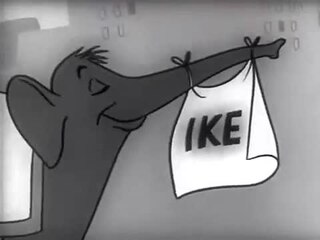
"Ike for President", sometimes referred to as "We'll Take Ike" or "I Like Ike", was a political television advertisement promoting Dwight D. Eisenhower's 1952 presidential campaign.












